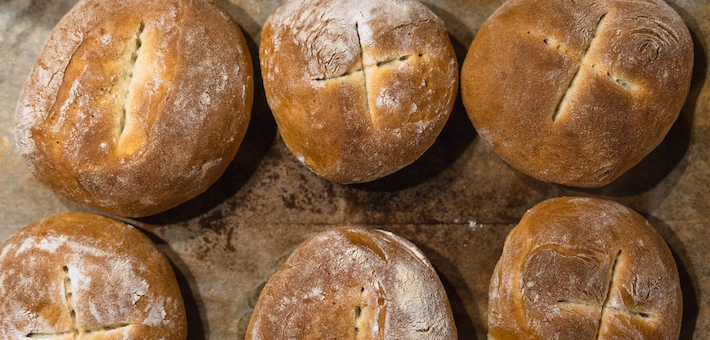Commentary on 2 Kings 4:42-44
Second Kings 4:42-44 is part of a narrative complex (1 Kings 17-2 Kings 9) that depicts the struggle of prophetic figures (Elijah and Elisha) to keep the people of Israel’s focus on their God with whom they had a covenant relationship.
Elijah had initiated this attempt to convince the people of Israel that their God, and not the Canaanite God Baal, was their only true God by demonstrating subtly at first to the people Baal’s impotence and their God’s superiority: announcing a drought as way to counter belief in Baal as the giver of rain; showing God’s care for people in distress—providing for the Phoenician widow by the miracle of the never failing jar of meal and oil (1 Kings 17:8-16) and reviving her son from near death (1 Kings 17:17-24).
Then Elijah takes head on the proponents of Baal religion with the contest between Baal’s prophets and Elijah at Mt. Carmel (1 Kings 18:1-46). Elisha, who succeeds Elijah, picks up the mantle of continuing to seek Israel’s loyalty to their God by showing God’s care and power through miracles. In 2 Kings 4 Elisha continues his ministry of rescuing those in distress that initiated his ministry in 2 Kings 2:19-22 when he purified water for a city.
The portion selected for the 25th Sunday after Pentecost concludes the chapter that has a series of five miracles. For the first miracle, Elisha is able to give security to a widow in distress because she cannot pay her debts and consequently, her two sons are being threatened with enslavement (2 Kings 4:1-7). The second miracle concerns Elisha’s prophecy that a childless couple would have a child (4:8-17). The third depicts the revival of the child after an illness and death (4:18-37). In the fourth miracle, Elisha successfully detoxified a pot of stew that had been rendered poisonous, for his group of prophets (4:38-41). The fifth miracle is about Elisha’s ability to feed a hundred people with what seems to be a scarce provision (4:42-44).
The miracles in 4:38-42 and 4:42-42 share the same context of scarcity from times of famine. The desperate situation in the first story is shown by the fact that when the pot of stew is rendered poisonous, it is not thrown away to be replaced by a fresh pot of stew. Elisha has to doctor the existing pot of stew probably because there is nothing with which to make a fresh pot of stew. The group of prophets share the detoxified pot of stew. Elisha successfully turned a situation of death into a situation of life-giving. The story in 4:42-44 continues with the theme of scarcity but with an emphasis on sharing.
There is an irony in how the man who brought the food to Elisha is identified as “a man from Baal-Shalishah”. Remember, the general setting of the stories of Elijah and Elisha is competition for the religious souls of the Israelite people. The name of the place is attached to Baal, which might reflect that this place was or had become the center for the worship of Baal in the region of Ephraim. Shalishah is mentioned as one of the countries in the hills of Ephraim (1 Samuel 9:4). What I find interesting is that a man from this place “brought food from the first fruits to the man of God.” This signals that there were still a few faithful people who were focused on the true worship of their God. According to Leviticus 23:10-14 this offering was given to the priest at the sanctuary. Here this man is giving them to a person who is clearly not a priest. Does this reflect lack of priestly leadership at this time? Elisha was a leader of a prophetic guild that lived at the margins of society.
The amount he brings also seems to be a departure from what was originally instructed. It appears a bit extravagant if he is representing just himself: twenty loaves of barley and fresh ears of grain. It is not surprising that Elisha instructs that the food be given to the people because we have already seen him concerned about the well-being of others as long as they are not taunting him, as the small boys did early in his ministry (2 Kings 2:23-25). The response of the person instructed with setting the food before the people indicates that the amount of the offering is disproportionate to the number of people at the place—a context of scarcity. How do we expect people to behave in the reality of scarcity? Is there fear of a stampede? These questions bring to memory how some of us behaved in response to the perceived scarcity of basic needs at the beginning of the COVID-19 pandemic. Fear sometimes brings a spirit of individualism that disregards the needs of others and ignores the connections among us. A spirit of hoarding consumed the nation and empty shelves testified to perceived scarcity.
In the case of Elisha and the 100 people with him, when food was set before them, everyone ate and there was even some left over! Why? Maybe because people only took what they needed and were not hoarding for the next day. I imagine that there was a spirit of community and orderliness guided by Elisha’s trust in a God who had continuously demonstrated faithfulness in the face of unfaithfulness by the majority.
Indeed, the faithfulness of a few can serve a multitude and a spirit of sharing can be a sign of the loving presence of God in a context of real or perceived scarcity.



July 25, 2021